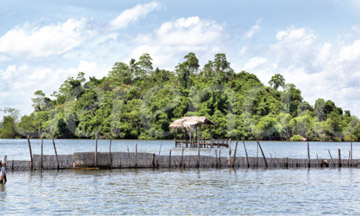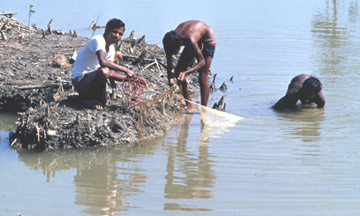|
FADs used in local waters:
Bigger fish harvest on the cards in coastal zones
By Naalir Jamaldeen
 |
| A shrimp farm |
 |
| Rural folk
engaged in shrimp harvesting |
National Aquatic Resources Research and Development Agency (NARA) has
implemented various marine research programs along Sri Lankan
territorial waters including Trincomalee. Sri Lanka has exclusive
Economic Zones (ETZ), NARA Chairman Dr. Sayuru Samarasundera said.
He said that comparatively fish production is low. Lack of knowledge
in operating modern fishing equipment and using poor technology are the
obstructing factors in identifying fish breeding places and the return
to shore with low harvest. NARA has implemented various training
programs targeting deep sea and shallow water fishermen.
"Due to this, fishing activities of fishermen is limited to a few
kilometers from the shore. Socio-economic studies have revealed that
fishermen still use traditional knowledge in fishing.
Fishermen are reluctant to use technologies and modern fishing
techniques. Production cost is high because of poor yield. Because of
poor harvest, fishermen are compelled to use illegal fishing equipment
and destructive fishing methods like dynamiting and bottom trawling.
Under the "Mahinda Chinthanaya" national development concept the
Fisheries and Aquatic Resources Development Ministry has drafted a
ten-year plan and NARA is gradually implementing it.
Tuna fish like Yellow fin tuna, Big Eye Tuna and Skip jack tuna
normally gather around floating objects. Sometimes it takes two or
several weeks to get to the exact spot. Fishermen spend a long time
searching for the spot where these varieties of fish are found", Dr.
Samarasundera said.
NARA has introduced Fish Aggravating Devices (FADs) along Sri Lankan
territorial waters. Normally FADs are made of using local material such
as Bamboo rafts, truck tyres, bamboo stacks, drum and some other methods
in shallow waters to catch small varieties of fish which breed in the
shallow waters, he said.
Dr. Samarasundera said that the FAD system was started in the 1984-85
period around the shallow waters off Ambalangoda, Galle, Tangalle and
Panadura. But the target could not be achieved and faded away in due
course of time. Material used did not last for a long time and anchoring
methods were also not effective.
Besides the FADs were sometimes damaged or destroyed by the rough
waves during monsoon and heavy wind seasons. The modern FADs are the
result of advanced technology and materials can be anchored over 3000
meters from the depth of sea. Large varieties of fish like Yellow fin
Tuna, Big eye Tuna, Skip jack tuna and the structure can be used for
long period of time. With the motorization of the fishing fleet, the
efficiency and range of operation of the fleet has increased by several
folds.
Many Asian countries which have advanced fishing industries like
China, Japan, the Philippines, the Maldives and Thailand use such
devices on larger scale. Specially Tuna varieties of fish is harvested
using this technology in these countries, he said.
"NARA has started some new experiments in the coastal zone in
Trincomalee since 2012. Two FADs have been made to float at depths of
around 30m in certain locations on an experimental level. The aim of
this research was to increase the fish production and to motivate the
fishermen towards using modern fishing equipment and to increase fish
production of this the country. The newly developed FADs will survive
even during heavy rain and waves created by heavy winds. The FADs are
inspected by the NARA marine officers from time to time", Dr.
Samarasundera said.
He said that the advent of modern technology in the fisheries sector
helps fishermen in predicting fish breeding places, temperature changes
in the seas. The FADs can be used effectively and thousands of families
which depend on fishery industry benefit.
The cost of production of advanced FAD is comparatively high. But
this cost will not be a burden because profits will be much higher than
the effort needed to harvest. The payback period of the investment is
comparatively shorter than other marine based industries, he noted.
Following the success of an experimental project in Trincomalee, NARA
Technologists have anchored five highly effective FADs in five
identified specific locations off the Eastern seas this year. Most of
them are close to the edge of the continental shelf, orts made by NARA
to increase Marine Fish Production in Sri Lanka, according to Dr.
Samarasundera.
"Improvement of the rural economy is the need of the hour.
Aquaculture plays a pivotal role in increasing food production and to
eliminate malnutrition from the country. Marine resources are also one
of the main sectors which help to eliminate malnutrition while
contributing to the national economy. Lanka shrimp is the first
demonstration carried out by NARA in the aquaculture sector. Surveys in
the sectors like inland aquaculture, ornamental fish, mollusks, and
other sectors will also be carried out", he said.
The Aquaculture sector needs proper management socially and
environmentally. Increased access to knowledge is required to develop
ecologically sound and profitable aquaculture systems and to ensure that
it successfully contributes to sustainable rural livelihoods.
The Sri Lanka Aquaculture Portal web site has been developed as part
of an international research collaboration project between Canada and
Sri Lanka called Promoting rural income from sustainable aquaculture
through social learning in Sri Lanka.
This project was supported by the Canada International Development
Agency (CIDA) and the International Development Research Centre (IDRC)
through the Canadian International Food Security Research Fund (CIFSRF).
The project collaborators are the Faculty of Veterinary Medicine,
University of Calgary, Canada, and the Faculty of Livestock, Fisheries
and Nutrition, Wayamba University of Sri Lanka in partnership with the
North Western Provincial Council Ministry of Fisheries, National Aquatic
Resources Research and Development Authority (NARA) and voluntary
organizations including Sri Lanka Aquaculture Development Alliance (SLADA),
shrimp farm organizations, and the Aquaculture Technology Society, Dr.
Samarasundera said.
The aim is to find innovative ways to deliver market, technology, and
environmental information about aquaculture to households, farms, and
businesses in Sri Lanka. Expected outcomes include Increased aquaculture
productivity and income, Improved knowledge and information-sharing
between aquaculture farmers Widespread availability of technical
information in local languages, and Creation of a legacy of farmers,
including women, able to access, share, and apply knowledge about
sustainable aquaculture, he said.
Conduct marine resource surveys an d stock assessment studies Conduct
marine environment impact assessments studies, Assist in identification
of marine organisms Provide guidelines and assist in developing
strategies for conservation of endangered marine species Technical
advice for marine resource management Conduct training programs on
marine fisheries management Supervision of projects on marine biology
and fisheries undertaken by graduates and school children Disease
diagnosis of fish and shrimp Testing of water and soil quality for
aquaculture practices Site assessments for aquaculture Environmental
impact assessment of aquaculture practices Conduct training programs on
exotic and endemic breeding, propagation of aquatic plants, aquaculture
and wetland ecosystems, he noted. |

